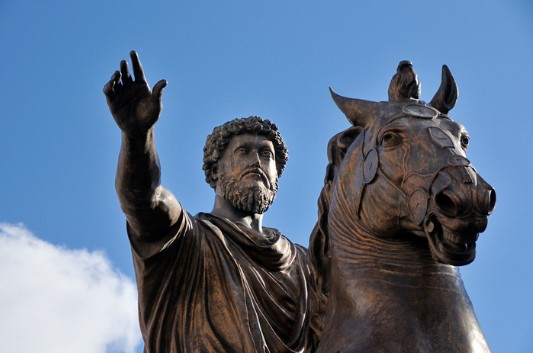
When I was a younger man I was super into self-discipline culture. I was studiously reading Marcus Aurelius and the Stoics, joining in on Reddit accountability threads, diligently tracking habits with the latest app or system-du-jour; all the stereotypical things you probably imagine. My deep unfulfillment was my motivation—I thought it was up to me to fix all the problems I saw in my life. I found it was a path well-trodden by other men my age.
Discipline as a way of life has its detractors too, but weirdly they can’t seem to stop living it either. Journal apps ping you “what are you grateful for?” at just the worst time, piling another item to the heap of things you impose upon yourself. Staying in the present seems to mean engaging in a constant, frustrated battle to banish impure thoughts of the past and future. How many times are we frantically told to not compare ourselves!! Don’t compare yourself EVER!! in repetitive sound bytes, or wait for trendy infographics to tell us how much a little fun, or a walk, or a nap, is “good for our health?” It’s just the same thing with different words.
I used to believe self-discipline was unquestionably good and that more = better, but not any more. Here’s why.
Self-discipline is about doing things you find unpleasant. There are two ways to do that: you either shut out and numb yourself to the unpleasantness, or you don’t.
Shutting down can seem suprisingly attractive in the moment, but the side-effects are insidious and invisible. Knowing what you don’t want is an important part of your sense of self. Turning off “I don’t like this” turns off “I like this” too, decalibrating your internal compass and leaving you devoid of any meaningful preferences. Of course, you don’t realise this is happening, because the part that would realise is the one being silenced!
You start out with a goal, but the path you take to get there makes you forget what it even was.
I was a resident advisor for most of undergrad and graduate school, so I spent a lot of time talking to young adults who were freaking out about what to do with their lives.
“What do you like to do?” I’d ask.
“I don’t know,” they’d say.
“Well, when you feel good, what is it you’re doing?”
They’d think for a while, then say something like, “I guess I like hanging out with my friends.”
Okay, so they at least haven’t suffered major brain damage, I’d think. […] I’d go through their classes and extracurriculars: do they like sociology 101? Intermediate computer science? Their dance group? The after-school tutoring that they do? Do any of these things make them feel alive?
[…] These were students who had eaten enough frogs to get into Princeton and Harvard. Their reward was––surprise!––more frogs. So they ate those frogs too. And now they’re staring down a whole lifetime of frog-eating and starting to feel like maybe something, somewhere has gone wrong. But they don’t know what else to do. They’ve so thoroughly subjugated their desires that they don’t even know what their desires are anymore.
– Excuse me but why are you eating so many frogs
If you don’t numb yourself, ok, you avoid that, but now you’re doing things you hate with full awareness. Which, by definition, sucks. It’s necessary sometimes, so it is good to develop in some amount, but you need to think about it as an investment. High self-discipline is only useful if you’re going through a lot of hard, horrible stuff; so if you put too much effort into it, you’re making a bet that your life will be full of misery. Any effort and time you would spend cultivating your self-discipline could instead be spent on looking for other paths that require less discipline. It’s a weird dynamic where the less you focus on it, often the less you end up needing.
Self-discipline is not a boundless virtue. It is contextual, and there are trade-offs to developing it. My heart hurts when I see my younger self in people. I want to tell them: you don’t need to suffer so much to be a good person.